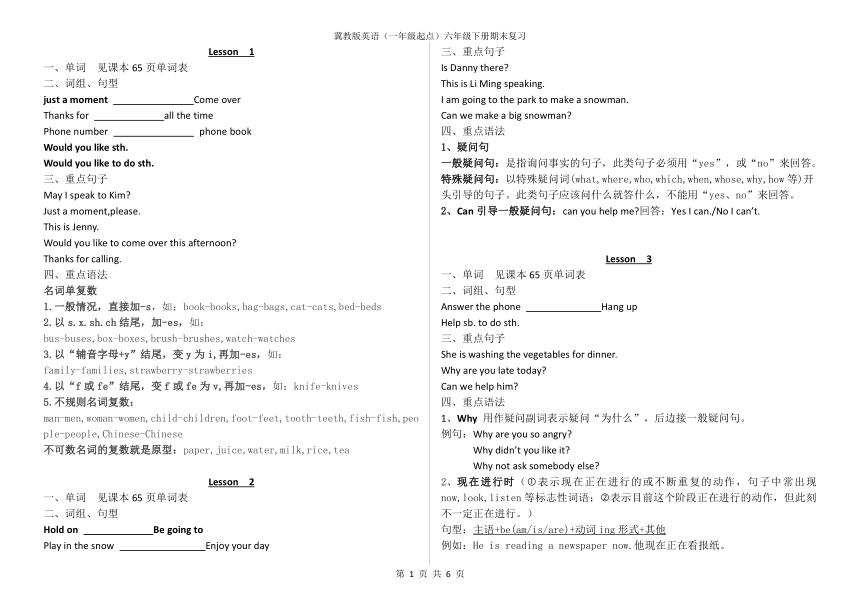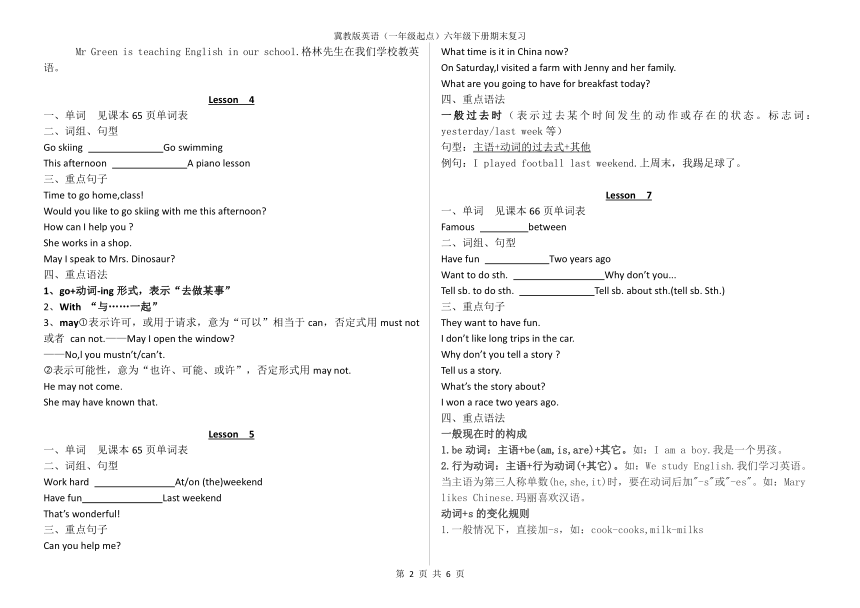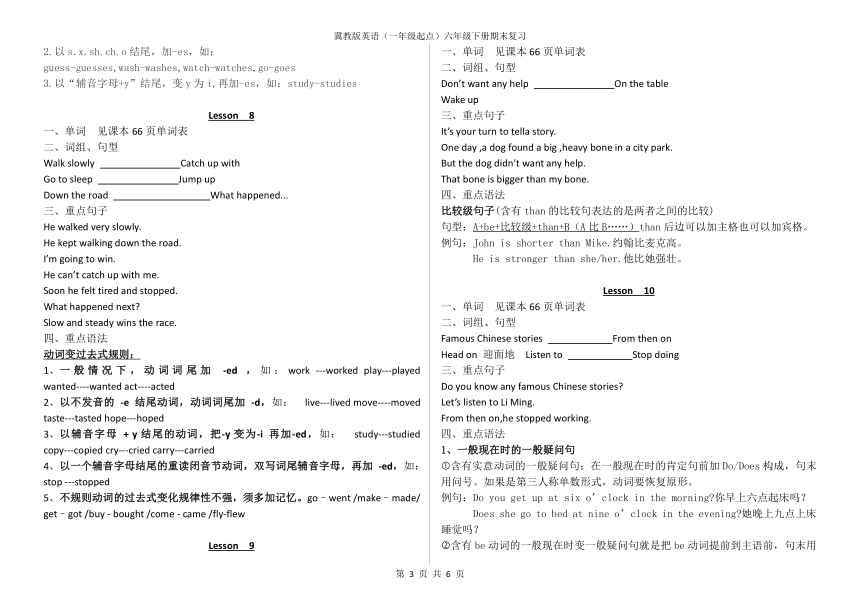冀教版(一年级起点)小学英语六年级下册期末复习学案
文档属性
| 名称 | 冀教版(一年级起点)小学英语六年级下册期末复习学案 |

|
|
| 格式 | zip | ||
| 文件大小 | 15.9KB | ||
| 资源类型 | 教案 | ||
| 版本资源 | 冀教版(一年级起点) | ||
| 科目 | 英语 | ||
| 更新时间 | 2017-04-01 00:00:00 | ||
图片预览



文档简介
冀教版英语(一年级起点)六年级下册期末复习
Lesson
1
单词
见课本65页单词表
词组、句型
just
a
moment
Come
over
Thanks
for
all
the
time
Phone
number
phone
book
Would
you
like
sth.
Would
you
like
to
do
sth.
重点句子
May
I
speak
to
Kim
Just
a
moment,please.
This
is
Jenny.
Would
you
like
to
come
over
this
afternoon
Thanks
for
calling.
重点语法
名词单复数
1.一般情况,直接加-s,如:book-books,bag-bags,cat-cats,bed-beds
2.以s.x.sh.ch结尾,加-es,如:bus-buses,box-boxes,brush-brushes,watch-watches
3.以“辅音字母+y”结尾,变y为i,再加-es,如:family-families,strawberry-strawberries
4.以“f或fe”结尾,变f或fe为v,再加-es,如:knife-knives
5.不规则名词复数:
man-men,woman-women,child-children,foot-feet,tooth-teeth,fish-fish,people-people,Chinese-Chinese
不可数名词的复数就是原型:paper,juice,water,milk,rice,tea
Lesson
2
一、单词
见课本65页单词表
二、词组、句型
Hold
on
Be
going
to
Play
in
the
snow
Enjoy
your
day
重点句子
Is
Danny
there
This
is
Li
Ming
speaking.
I
am
going
to
the
park
to
make
a
snowman.
Can
we
make
a
big
snowman
重点语法
1、疑问句
一般疑问句:是指询问事实的句子,此类句子必须用“yes”,或“no”来回答。
特殊疑问句:以特殊疑问词(what,where,who,which,when,whose,why,how等)开头引导的句子。此类句子应该问什么就答什么,不能用“yes、no”来回答。
2、Can引导一般疑问句:can
you
help
me 回答:Yes
I
can./No
I
can’t.
Lesson
3
一、单词
见课本65页单词表
二、词组、句型
Answer
the
phone
Hang
up
Help
sb.
to
do
sth.
重点句子
She
is
washing
the
vegetables
for
dinner.
Why
are
you
late
today
Can
we
help
him
重点语法
1、Why
用作疑问副词表示疑问“为什么”,后边接一般疑问句。
例句:Why
are
you
so
angry
Why
didn’t
you
like
it
Why
not
ask
somebody
else
现在进行时(表示现在正在进行的或不断重复的动作,句子中常出现now,look,listen等标志性词语;表示目前这个阶段正在进行的动作,但此刻不一定正在进行。)
句型:主语+be(am/is/are)+动词ing形式+其他
例如:He
is
reading
a
newspaper
now.他现在正在看报纸。
Mr
Green
is
teaching
English
in
our
school.格林先生在我们学校教英语。
Lesson
4
一、单词
见课本65页单词表
二、词组、句型
Go
skiing
Go
swimming
This
afternoon
A
piano
lesson
重点句子
Time
to
go
home,class!
Would
you
like
to
go
skiing
with
me
this
afternoon
How
can
I
help
you
She
works
in
a
shop.
May
I
speak
to
Mrs.
Dinosaur
重点语法
go+动词-ing形式,表示“去做某事”
With
“与……一起”
may表示许可,或用于请求,意为“可以”相当于can,否定式用must
not或者
can
not.——May
I
open
the
window
——No,l
you
mustn’t/can’t.
表示可能性,意为“也许、可能、或许”,否定形式用may
not.
He
may
not
come.
She
may
have
known
that.
Lesson
5
一、单词
见课本65页单词表
二、词组、句型
Work
hard
At/on
(the)weekend
Have
fun
Last
weekend
That’s
wonderful!
重点句子
Can
you
help
me
What
time
is
it
in
China
now
On
Saturday,I
visited
a
farm
with
Jenny
and
her
family.
What
are
you
going
to
have
for
breakfast
today
重点语法
一般过去时(表示过去某个时间发生的动作或存在的状态。标志词:yesterday/last
week等)
句型:主语+动词的过去式+其他
例句:I
played
football
last
weekend.上周末,我踢足球了。
Lesson
7
单词
见课本66页单词表
Famous
between
二、词组、句型
Have
fun
Two
years
ago
Want
to
do
sth.
Why
don’t
you...
Tell
sb.
to
do
sth.
Tell
sb.
about
sth.(tell
sb.
Sth.)
重点句子
They
want
to
have
fun.
I
don’t
like
long
trips
in
the
car.
Why
don’t
you
tell
a
story
Tell
us
a
story.
What’s
the
story
about
I
won
a
race
two
years
ago.
重点语法
一般现在时的构成
1.be动词:主语+be(am,is,are)+其它。如:I
am
a
boy.我是一个男孩。
2.行为动词:主语+行为动词(+其它)。如:We
study
English.我们学习英语。
当主语为第三人称单数(he,she,it)时,要在动词后加"-s"或"-es"。如:Mary
likes
Chinese.玛丽喜欢汉语。
动词+s的变化规则
1.一般情况下,直接加-s,如:cook-cooks,milk-milks
2.以s.x.sh.ch.o结尾,加-es,如:guess-guesses,wash-washes,watch-watches,go-goes
3.以“辅音字母+y”结尾,变y为i,再加-es,如:study-studies
Lesson
8
一、单词
见课本66页单词表
二、词组、句型
Walk
slowly
Catch
up
with
Go
to
sleep
Jump
up
Down
the
road
What
happened...
重点句子
He
walked
very
slowly.
He
kept
walking
down
the
road.
I’m
going
to
win.
He
can’t
catch
up
with
me.
Soon
he
felt
tired
and
stopped.
What
happened
next
Slow
and
steady
wins
the
race.
重点语法
动词变过去式规则:
一般情况下,动词词尾加
-ed
,如:work
---worked
play---played
wanted----wanted
act----acted
以不发音的
-e
结尾动词,动词词尾加
-d,如:
live---lived
move----moved
taste---tasted
hope---hoped
以辅音字母
+
y结尾的动词,把-y变为-i
再加-ed,如:
study---studied
copy---copied
cry---cried
carry---carried
以一个辅音字母结尾的重读闭音节动词,双写词尾辅音字母,再加
-ed,如:
stop
---stopped
不规则动词的过去式变化规律性不强,须多加记忆。go–went
/make–made/
get–got
/buy
-
bought
/come
-
came
/fly-flew
Lesson
9
一、单词
见课本66页单词表
二、词组、句型
Don’t
want
any
help
On
the
table
Wake
up
重点句子
It’s
your
turn
to
tella
story.
One
day
,a
dog
found
a
big
,heavy
bone
in
a
city
park.
But
the
dog
didn’t
want
any
help.
That
bone
is
bigger
than
my
bone.
重点语法
比较级句子(含有than的比较句表达的是两者之间的比较)
句型:A+be+比较级+than+B(A比B……)than后边可以加主格也可以加宾格。
例句:John
is
shorter
than
Mike.约翰比麦克高。
He
is
stronger
than
she/her.他比她强壮。
Lesson
10
一、单词
见课本66页单词表
二、词组、句型
Famous
Chinese
stories
From
then
on
Head
on
迎面地
Listen
to
Stop
doing
重点句子
Do
you
know
any
famous
Chinese
stories
Let’s
listen
to
Li
Ming.
From
then
on,he
stopped
working.
重点语法
1、一般现在时的一般疑问句
含有实意动词的一般疑问句:在一般现在时的肯定句前加Do/Does构成,句末用问号。如果是第三人称单数形式,动词要恢复原形。
例句:Do
you
get
up
at
six
o’clock
in
the
morning 你早上六点起床吗?
Does
she
go
to
bed
at
nine
o’clock
in
the
evening 她晚上九点上床睡觉吗?
含有be动词的一般现在时变一般疑问句就是把be动词提前到主语前,句末用问号。
例句:Are
you
a
student 你是一名学生吗?
Is
she
ten
listen的用法
Listen
为不及物动词,指的是听的过程,表示“听……”由“listen
to
+名词/代词”的结构表示。
例句:listen
!what
can
you
hear
Listen
to
me
carefully,please.
Lesson
11
一、单词
见课本67页单词表
二、词组、句型
An
old
man
Run
after
Go
on
Look
for
Look
at
Have
to
Just
right
Go
for
a
walk
重点句子
A
wolf
ran
up
to
him.
Some
people
are
running
after
me
.
Did
you
see
a
wolf
It
ate
our
sheep
and
pigs.
But
I
just
saved
you,didn’t
I
四、重点语法
there
be
句型
主要用以表达“某处有某人或某物”,其基本句型是“There
be
+
某物/某人+其他”
例句:There
is/was
a
old
man.
There
is
a
football
under
the
chair.
Lesson
13
一、单词
见课本67页单词表
二、词组、句型
Go
on
a
trip/go
on
trips
Summer
holiday
Like
to
do
sth./like
doing
sth.
Last
summer
On
the
beach
In
the
sea/on
the
sea
By
ship
/take
a
ship
重点句子
What
will
you
do
for
the
summer
holiday
My
family
likes
to
go
on
trips
in
summer.
I
like
playing
on
the
beach
.
四、重点语法
如何询问对方的计划?
What
will
you
do
+
其他?
回答:i
will
+动词(短语)原形(+其他)
例句:what
will
you
do
for
this
summer
I
will
go
on
a
trip
to
the
sea
.
Lesson
14
一、单词
见课本67页单词表
二、词组、句型
Go
home
By
plane
Hope
school
重点句子
I
will
go
home
by
plane.
I
will
visit
my
grandparents.
I
will
miss
you
.
I’m
right./I’m
ok!
我是对的/我很好。
重点语法
1、含有will的一般将来时(表示将要发生的动作或存在的状态。)
句型:主语+will+动词原形+其他(Yes,I/He
will.
No,I/He
won’t.)
例句:I
will
go
to
a
summer
camp
this
year.今年我将要去参加一个夏令营。
介词
at+几点,on+几号、星期几,in+几月、哪一年
Lesson
15
一、单词
见课本67页单词表
二、词组、句型
This
summer
Far
from
the
Great
Wall
Very
interesting
重点句子
Will
you
swim
in
the
sea
No
,I
won’t./I
will
not.
What
else
will
you
do
That
will
be
very
interesting.
重点语法
一般将来时的一般疑问句
把will提前到主语之前,结尾变问号,其结构为:will+主语+动词原形+其他?肯定回答:Yes,主语+will,否定回答是No,主语+won’t.
例句:Will
you
go
shopping
this
afternoon
Yes,I
will./No,I
won’t.
Lesson
16
一、单词
见课本67页单词表
二、词组、句型
Summer
camp
Play
the
violin
Play
basketball
Make
a
basket
重点句子
They
threw
the
ball
to
each
other.
Would
you
like
to
play
on
the
school
basketball
team
He
likes
to
play
with
his
friends.
重点语法
Play的用法
演奏乐器:play+the+单数乐器名词
。如:play
the
piano
进行某种球类运动:play+球类名词单数
play
football
Lesson
17
一、单词
见课本68页单词表
二、词组、句型
Water
skiing
Go
skating
Fly
a
kite
Send
emails
Make
new
friends
All
of
us
In
the
sky
Birthday
party
Get
ready
for
On
the
playground
重点句子
I
will
go
to
a
summer
camp
this
year!
I
am
sending
you
this
email
now.
All
of
us
will
go
to
school
by
bike.
重点语法
Lesson
19
一、单词
见课本68页单词表
二、词组、句型
Buy
sth.
for
sb.
A
surprise
for
sb.
To
one’s
surprise
Next
week
Fly
home
What/How
about
重点句子
He
wants
to
buy
some
gifts
for
his
family.
Here
are
some
little
flags
of
Canada.
How
many
gifts
does
Li
Ming
need
What
do
you
want
to
buy
What/How
about
these
caps
How
much
are
the
gifts
重点语法
询问价格的句型——How
much...
意为“多少钱”,可以单独使用,句型:How
much+be动词+物品?
答语:It’s
/They‘re+数词+货币单位
例句:How
much
are
the
gifts
It’s
18
yuan.
What
about... 的用法
意思是“……怎么样?”是一句客套话后面可接名词、代词或动词ing形式,相当于“How
about... ”
例句:What
/How
about
these
caps
Lesson
20
一、单词
见课本68页单词表
二、词组、句型
Ping-pong
ball
Last
Sunday
重点句子
Danny
said
the
basketball
was
heavy.
I
want
to
teach
him
to
play
football.
四、重点语法
May
I... 表示请求
征求对方的许可做某事,肯定回答用Yes./Sure./Certainly./Of
course.
That
OK./Yes
please.
拒绝对方时,回答No,you
mustn’t./No,you
can’t/Sorry,you
can’t/No,please
don’t等。
例句:——May
I
watch
TV
now
——No,you
mustn’t.
Lesson
21
一、单词
见课本68页单词表
二、词组、句型
Let’s
see
Let
sb.
do
sth.
Let
sb.
not
do
sth.
重点句子
What
time
does
it
begin
How
many
people
are
coming
to
the
party
He
will
invite
some
friends.
The
meeting
begins
at
4:00
in
the
afternoon.
重点语法
如何询问某事开始的时间——What
time
does
...begin
句型:What
time
does+某事(the
party
/the
film
/
the
game...)+begin
答语:At+具体时间
例句:——What
time
does
it
begin?
——At
4:00
in
the
afternoon.
Lesson
22
一、单词
见课本68页单词表
二、词组、句型
Open
the
door
Be
late
for
三、重点句子
This
cake
is
for
me.
Li
Ming
doesn’t
know
about
the
party.
Danny
opens
the
door.
Is
Steven
late
for
the
party
What
name
begins
with
the
letter
L
Let’s
go
to
the
shop
to
buy
some
cookies.
重点语法
This
is
for...的用法
给别人物品,可以用句型“This
is
for
...(这是给……的)
”后面接具体的某人。
例句:This
is
for
Mike。
Lesson
23
一、单词
见课本68页单词表
二、词组、句型
Be
leaving
for
It’s
time
(for
sb.
)to
do
sth.
It’s
time
for
sth.
Give
sb.
Sth.=give
sth.
to
sb.
Forget
to
do
sth.
Forget
doing
sth.
重点句子
Li
Ming
is
leaving
for
China.
It’s
time
for
me
to
go.
The
plane
for
Beijing
will
leave
soon.
四、重点语法
Lesson
1
单词
见课本65页单词表
词组、句型
just
a
moment
Come
over
Thanks
for
all
the
time
Phone
number
phone
book
Would
you
like
sth.
Would
you
like
to
do
sth.
重点句子
May
I
speak
to
Kim
Just
a
moment,please.
This
is
Jenny.
Would
you
like
to
come
over
this
afternoon
Thanks
for
calling.
重点语法
名词单复数
1.一般情况,直接加-s,如:book-books,bag-bags,cat-cats,bed-beds
2.以s.x.sh.ch结尾,加-es,如:bus-buses,box-boxes,brush-brushes,watch-watches
3.以“辅音字母+y”结尾,变y为i,再加-es,如:family-families,strawberry-strawberries
4.以“f或fe”结尾,变f或fe为v,再加-es,如:knife-knives
5.不规则名词复数:
man-men,woman-women,child-children,foot-feet,tooth-teeth,fish-fish,people-people,Chinese-Chinese
不可数名词的复数就是原型:paper,juice,water,milk,rice,tea
Lesson
2
一、单词
见课本65页单词表
二、词组、句型
Hold
on
Be
going
to
Play
in
the
snow
Enjoy
your
day
重点句子
Is
Danny
there
This
is
Li
Ming
speaking.
I
am
going
to
the
park
to
make
a
snowman.
Can
we
make
a
big
snowman
重点语法
1、疑问句
一般疑问句:是指询问事实的句子,此类句子必须用“yes”,或“no”来回答。
特殊疑问句:以特殊疑问词(what,where,who,which,when,whose,why,how等)开头引导的句子。此类句子应该问什么就答什么,不能用“yes、no”来回答。
2、Can引导一般疑问句:can
you
help
me 回答:Yes
I
can./No
I
can’t.
Lesson
3
一、单词
见课本65页单词表
二、词组、句型
Answer
the
phone
Hang
up
Help
sb.
to
do
sth.
重点句子
She
is
washing
the
vegetables
for
dinner.
Why
are
you
late
today
Can
we
help
him
重点语法
1、Why
用作疑问副词表示疑问“为什么”,后边接一般疑问句。
例句:Why
are
you
so
angry
Why
didn’t
you
like
it
Why
not
ask
somebody
else
现在进行时(表示现在正在进行的或不断重复的动作,句子中常出现now,look,listen等标志性词语;表示目前这个阶段正在进行的动作,但此刻不一定正在进行。)
句型:主语+be(am/is/are)+动词ing形式+其他
例如:He
is
reading
a
newspaper
now.他现在正在看报纸。
Mr
Green
is
teaching
English
in
our
school.格林先生在我们学校教英语。
Lesson
4
一、单词
见课本65页单词表
二、词组、句型
Go
skiing
Go
swimming
This
afternoon
A
piano
lesson
重点句子
Time
to
go
home,class!
Would
you
like
to
go
skiing
with
me
this
afternoon
How
can
I
help
you
She
works
in
a
shop.
May
I
speak
to
Mrs.
Dinosaur
重点语法
go+动词-ing形式,表示“去做某事”
With
“与……一起”
may表示许可,或用于请求,意为“可以”相当于can,否定式用must
not或者
can
not.——May
I
open
the
window
——No,l
you
mustn’t/can’t.
表示可能性,意为“也许、可能、或许”,否定形式用may
not.
He
may
not
come.
She
may
have
known
that.
Lesson
5
一、单词
见课本65页单词表
二、词组、句型
Work
hard
At/on
(the)weekend
Have
fun
Last
weekend
That’s
wonderful!
重点句子
Can
you
help
me
What
time
is
it
in
China
now
On
Saturday,I
visited
a
farm
with
Jenny
and
her
family.
What
are
you
going
to
have
for
breakfast
today
重点语法
一般过去时(表示过去某个时间发生的动作或存在的状态。标志词:yesterday/last
week等)
句型:主语+动词的过去式+其他
例句:I
played
football
last
weekend.上周末,我踢足球了。
Lesson
7
单词
见课本66页单词表
Famous
between
二、词组、句型
Have
fun
Two
years
ago
Want
to
do
sth.
Why
don’t
you...
Tell
sb.
to
do
sth.
Tell
sb.
about
sth.(tell
sb.
Sth.)
重点句子
They
want
to
have
fun.
I
don’t
like
long
trips
in
the
car.
Why
don’t
you
tell
a
story
Tell
us
a
story.
What’s
the
story
about
I
won
a
race
two
years
ago.
重点语法
一般现在时的构成
1.be动词:主语+be(am,is,are)+其它。如:I
am
a
boy.我是一个男孩。
2.行为动词:主语+行为动词(+其它)。如:We
study
English.我们学习英语。
当主语为第三人称单数(he,she,it)时,要在动词后加"-s"或"-es"。如:Mary
likes
Chinese.玛丽喜欢汉语。
动词+s的变化规则
1.一般情况下,直接加-s,如:cook-cooks,milk-milks
2.以s.x.sh.ch.o结尾,加-es,如:guess-guesses,wash-washes,watch-watches,go-goes
3.以“辅音字母+y”结尾,变y为i,再加-es,如:study-studies
Lesson
8
一、单词
见课本66页单词表
二、词组、句型
Walk
slowly
Catch
up
with
Go
to
sleep
Jump
up
Down
the
road
What
happened...
重点句子
He
walked
very
slowly.
He
kept
walking
down
the
road.
I’m
going
to
win.
He
can’t
catch
up
with
me.
Soon
he
felt
tired
and
stopped.
What
happened
next
Slow
and
steady
wins
the
race.
重点语法
动词变过去式规则:
一般情况下,动词词尾加
-ed
,如:work
---worked
play---played
wanted----wanted
act----acted
以不发音的
-e
结尾动词,动词词尾加
-d,如:
live---lived
move----moved
taste---tasted
hope---hoped
以辅音字母
+
y结尾的动词,把-y变为-i
再加-ed,如:
study---studied
copy---copied
cry---cried
carry---carried
以一个辅音字母结尾的重读闭音节动词,双写词尾辅音字母,再加
-ed,如:
stop
---stopped
不规则动词的过去式变化规律性不强,须多加记忆。go–went
/make–made/
get–got
/buy
-
bought
/come
-
came
/fly-flew
Lesson
9
一、单词
见课本66页单词表
二、词组、句型
Don’t
want
any
help
On
the
table
Wake
up
重点句子
It’s
your
turn
to
tella
story.
One
day
,a
dog
found
a
big
,heavy
bone
in
a
city
park.
But
the
dog
didn’t
want
any
help.
That
bone
is
bigger
than
my
bone.
重点语法
比较级句子(含有than的比较句表达的是两者之间的比较)
句型:A+be+比较级+than+B(A比B……)than后边可以加主格也可以加宾格。
例句:John
is
shorter
than
Mike.约翰比麦克高。
He
is
stronger
than
she/her.他比她强壮。
Lesson
10
一、单词
见课本66页单词表
二、词组、句型
Famous
Chinese
stories
From
then
on
Head
on
迎面地
Listen
to
Stop
doing
重点句子
Do
you
know
any
famous
Chinese
stories
Let’s
listen
to
Li
Ming.
From
then
on,he
stopped
working.
重点语法
1、一般现在时的一般疑问句
含有实意动词的一般疑问句:在一般现在时的肯定句前加Do/Does构成,句末用问号。如果是第三人称单数形式,动词要恢复原形。
例句:Do
you
get
up
at
six
o’clock
in
the
morning 你早上六点起床吗?
Does
she
go
to
bed
at
nine
o’clock
in
the
evening 她晚上九点上床睡觉吗?
含有be动词的一般现在时变一般疑问句就是把be动词提前到主语前,句末用问号。
例句:Are
you
a
student 你是一名学生吗?
Is
she
ten
listen的用法
Listen
为不及物动词,指的是听的过程,表示“听……”由“listen
to
+名词/代词”的结构表示。
例句:listen
!what
can
you
hear
Listen
to
me
carefully,please.
Lesson
11
一、单词
见课本67页单词表
二、词组、句型
An
old
man
Run
after
Go
on
Look
for
Look
at
Have
to
Just
right
Go
for
a
walk
重点句子
A
wolf
ran
up
to
him.
Some
people
are
running
after
me
.
Did
you
see
a
wolf
It
ate
our
sheep
and
pigs.
But
I
just
saved
you,didn’t
I
四、重点语法
there
be
句型
主要用以表达“某处有某人或某物”,其基本句型是“There
be
+
某物/某人+其他”
例句:There
is/was
a
old
man.
There
is
a
football
under
the
chair.
Lesson
13
一、单词
见课本67页单词表
二、词组、句型
Go
on
a
trip/go
on
trips
Summer
holiday
Like
to
do
sth./like
doing
sth.
Last
summer
On
the
beach
In
the
sea/on
the
sea
By
ship
/take
a
ship
重点句子
What
will
you
do
for
the
summer
holiday
My
family
likes
to
go
on
trips
in
summer.
I
like
playing
on
the
beach
.
四、重点语法
如何询问对方的计划?
What
will
you
do
+
其他?
回答:i
will
+动词(短语)原形(+其他)
例句:what
will
you
do
for
this
summer
I
will
go
on
a
trip
to
the
sea
.
Lesson
14
一、单词
见课本67页单词表
二、词组、句型
Go
home
By
plane
Hope
school
重点句子
I
will
go
home
by
plane.
I
will
visit
my
grandparents.
I
will
miss
you
.
I’m
right./I’m
ok!
我是对的/我很好。
重点语法
1、含有will的一般将来时(表示将要发生的动作或存在的状态。)
句型:主语+will+动词原形+其他(Yes,I/He
will.
No,I/He
won’t.)
例句:I
will
go
to
a
summer
camp
this
year.今年我将要去参加一个夏令营。
介词
at+几点,on+几号、星期几,in+几月、哪一年
Lesson
15
一、单词
见课本67页单词表
二、词组、句型
This
summer
Far
from
the
Great
Wall
Very
interesting
重点句子
Will
you
swim
in
the
sea
No
,I
won’t./I
will
not.
What
else
will
you
do
That
will
be
very
interesting.
重点语法
一般将来时的一般疑问句
把will提前到主语之前,结尾变问号,其结构为:will+主语+动词原形+其他?肯定回答:Yes,主语+will,否定回答是No,主语+won’t.
例句:Will
you
go
shopping
this
afternoon
Yes,I
will./No,I
won’t.
Lesson
16
一、单词
见课本67页单词表
二、词组、句型
Summer
camp
Play
the
violin
Play
basketball
Make
a
basket
重点句子
They
threw
the
ball
to
each
other.
Would
you
like
to
play
on
the
school
basketball
team
He
likes
to
play
with
his
friends.
重点语法
Play的用法
演奏乐器:play+the+单数乐器名词
。如:play
the
piano
进行某种球类运动:play+球类名词单数
play
football
Lesson
17
一、单词
见课本68页单词表
二、词组、句型
Water
skiing
Go
skating
Fly
a
kite
Send
emails
Make
new
friends
All
of
us
In
the
sky
Birthday
party
Get
ready
for
On
the
playground
重点句子
I
will
go
to
a
summer
camp
this
year!
I
am
sending
you
this
now.
All
of
us
will
go
to
school
by
bike.
重点语法
Lesson
19
一、单词
见课本68页单词表
二、词组、句型
Buy
sth.
for
sb.
A
surprise
for
sb.
To
one’s
surprise
Next
week
Fly
home
What/How
about
重点句子
He
wants
to
buy
some
gifts
for
his
family.
Here
are
some
little
flags
of
Canada.
How
many
gifts
does
Li
Ming
need
What
do
you
want
to
buy
What/How
about
these
caps
How
much
are
the
gifts
重点语法
询问价格的句型——How
much...
意为“多少钱”,可以单独使用,句型:How
much+be动词+物品?
答语:It’s
/They‘re+数词+货币单位
例句:How
much
are
the
gifts
It’s
18
yuan.
What
about... 的用法
意思是“……怎么样?”是一句客套话后面可接名词、代词或动词ing形式,相当于“How
about... ”
例句:What
/How
about
these
caps
Lesson
20
一、单词
见课本68页单词表
二、词组、句型
Ping-pong
ball
Last
Sunday
重点句子
Danny
said
the
basketball
was
heavy.
I
want
to
teach
him
to
play
football.
四、重点语法
May
I... 表示请求
征求对方的许可做某事,肯定回答用Yes./Sure./Certainly./Of
course.
That
OK./Yes
please.
拒绝对方时,回答No,you
mustn’t./No,you
can’t/Sorry,you
can’t/No,please
don’t等。
例句:——May
I
watch
TV
now
——No,you
mustn’t.
Lesson
21
一、单词
见课本68页单词表
二、词组、句型
Let’s
see
Let
sb.
do
sth.
Let
sb.
not
do
sth.
重点句子
What
time
does
it
begin
How
many
people
are
coming
to
the
party
He
will
invite
some
friends.
The
meeting
begins
at
4:00
in
the
afternoon.
重点语法
如何询问某事开始的时间——What
time
does
...begin
句型:What
time
does+某事(the
party
/the
film
/
the
game...)+begin
答语:At+具体时间
例句:——What
time
does
it
begin?
——At
4:00
in
the
afternoon.
Lesson
22
一、单词
见课本68页单词表
二、词组、句型
Open
the
door
Be
late
for
三、重点句子
This
cake
is
for
me.
Li
Ming
doesn’t
know
about
the
party.
Danny
opens
the
door.
Is
Steven
late
for
the
party
What
name
begins
with
the
letter
L
Let’s
go
to
the
shop
to
buy
some
cookies.
重点语法
This
is
for...的用法
给别人物品,可以用句型“This
is
for
...(这是给……的)
”后面接具体的某人。
例句:This
is
for
Mike。
Lesson
23
一、单词
见课本68页单词表
二、词组、句型
Be
leaving
for
It’s
time
(for
sb.
)to
do
sth.
It’s
time
for
sth.
Give
sb.
Sth.=give
sth.
to
sb.
Forget
to
do
sth.
Forget
doing
sth.
重点句子
Li
Ming
is
leaving
for
China.
It’s
time
for
me
to
go.
The
plane
for
Beijing
will
leave
soon.
四、重点语法
同课章节目录
- Unit 1 Phoning Home
- Lesson 1 Let's call a friend!
- Lesson 2 Is Danny there?
- Lesson 3 Dad calls home
- Lesson 4 I need to call my mothe
- Lesson 5 Li Ming calls China
- Lesson 6 Baby Becky answers the phone
- Unit 2 Tell Me a Story
- Lesson 7 Jenny tells a story
- Lesson 8 The tortoise and the rabbit
- Lesson 9 Danny tells a story
- Lesson 10 Li Ming tells a story
- Lesson 11 An old man and a wolf
- Lesson 12 The three bears
- Unit 3 Summer is coming
- Lesson 13 Jenny's summer holiday
- Lesson 14 Li Ming's summer holiday
- Lesson 15 Danny's summer holiday
- Lesson 16 Joe and his basketball
- Lesson 17 Summer camp in Canada
- Lesson 18 Three kites in the sky
- Unit 4 Li Ming comes Home
- Lesson 19 Buying gifts
- Lesson 20 Looking at photos
- Lesson 21 A party for Li Ming
- Lesson 22 Surprise!
- Lesson 23 Goodbye!
- Lesson 24 Danny's surprise cake
